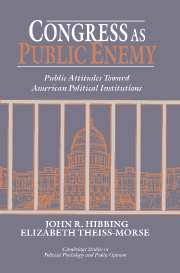Book contents
- Frontmatter
- Contents
- List of figures
- List of tables
- Preface
- CONGRESS AS PUBLIC ENEMY
- 1 Introduction: What is wrong with the American political system?
- 2 Changing levels of support for individual institutions
- 3 Perceptions of political institutions
- 4 Perceptions of congressional features and reforms
- 5 Focus groups and perceptions of the Washington system
- 6 Who approves of Congress?
- 7 Support for democratic processes
- 8 Conclusion: The people and their political system
- Appendix
- References
- Index
4 - Perceptions of congressional features and reforms
Published online by Cambridge University Press: 05 August 2012
- Frontmatter
- Contents
- List of figures
- List of tables
- Preface
- CONGRESS AS PUBLIC ENEMY
- 1 Introduction: What is wrong with the American political system?
- 2 Changing levels of support for individual institutions
- 3 Perceptions of political institutions
- 4 Perceptions of congressional features and reforms
- 5 Focus groups and perceptions of the Washington system
- 6 Who approves of Congress?
- 7 Support for democratic processes
- 8 Conclusion: The people and their political system
- Appendix
- References
- Index
Summary
While no branch of government is without fault, the public's greatest disappointment is with Congress, the “first” institution. People view Congress as grossly inefficient and inequitable, but also as highly powerful. They believe members of Congress could be using their power for the good of the country, but instead use it for their own self-interested advantage. Given that most people like the institution of Congress very much, why do these same people believe the members of Congress are such an utter failure?
In this chapter, we begin to investigate the public's beliefs about what specifically is wrong with Congress, and in the next chapter we look at these beliefs in even greater depth. Stated simply, people think members of Congress have bought into the “Washington system,” which seduces members away from fulfilling their responsibility to the public. Members of Congress are quickly corrupted by special interests and lobbyists, by the office perquisites they receive, and by the people who surround and indulge them. Once the public is convinced this has happened, members of Congress cannot do anything right. The various congressional scandals that hit the media simply provide proof that public judgment is correct. People think inefficiency and especially inequity reign supreme.
But are people's perceptions of the Washington system on target? Perhaps their hostility is in part an outgrowth of serious misperceptions of, for example, the perquisites members of Congress receive.
- Type
- Chapter
- Information
- Congress as Public EnemyPublic Attitudes toward American Political Institutions, pp. 62 - 83Publisher: Cambridge University PressPrint publication year: 1995



